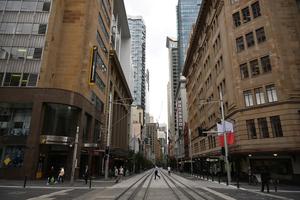 Near-deserted streets are seen in the central business district as people stay home due to the COVID-19 novel coronavirus outbreak in Sydney on March 30, 2020. (PETER PARKS / AFP)
Near-deserted streets are seen in the central business district as people stay home due to the COVID-19 novel coronavirus outbreak in Sydney on March 30, 2020. (PETER PARKS / AFP)
Australians are slowly coming to terms with the fact that life will never be the same as the country adjusts with the reality of COVID-19.
Beaches and parks are empty, towns and cities around the country are deserted, sporting events have been canceled, businesses have shut down and unemployment is skyrocketing. The military is now helping the police ensure that people obey the new social order rules-to self-isolate, keep off the streets unless absolutely necessary and practice "social distancing".
Beaches and parks are empty, towns and cities around the country are deserted, sporting events have been canceled, businesses have shut down and unemployment is skyrocketing
Australians fear that hundreds if not thousands will die if they do not follow the rules set down by the government and health experts who rely heavily on mathematical modeling for their predictions.
READ MORE: Australia braces for worst-case scenarios
Raina MacIntyre, who heads the biosecurity program at the Kirby Institute at the University of New South Wales in Sydney, said: "We must do everything to protect our people. … I hope Australia has learned from China that it is possible to control a COVID epidemic."
One of the main concerns of frontline medical staff in Australia is the lack of basic personal protective equipment, or PPE, such as face masks.
ALSO READ: Australia says no collusion in decision to withdraw from 2020 Games
In an open letter to the prime minister, health care workers said: "We need sufficient supplies of adequate PPE and we need it now, before the system collapses."
"The COVID-19 pandemic is here in Australia, and we are simply ignoring the difficult lessons learned by our colleagues in Italy, China, and elsewhere."
The state premiers and Prime Minister Scott Morrison are struggling to keep the nation's economy afloat.
Morrison did establish a national cabinet, including all state and territory leaders, the first in Australian history, and has announced significant support for business, workers and those thrown out of work-all up, worth A$189 billion (US$115 billion), or almost 10 percent of GDP.
Stringent measures
On Monday the government announced a A$130 billion "job keeper" program in which workers (full and part-time) will be paid A$1,500 a fortnight for the next six months.
On Monday the government announced a A$130 billion "job keeper" program in which workers (full and part-time) will be paid A$1,500 a fortnight for the next six months
The government on Sunday tightened its social order rules restricting gatherings outside the home to just two people. And people over 70 have been asked to stay at home while the military has been mobilized to back up police throughout the country.
Australians lucky enough to make it home are taken from the airport to hotels where they are put into self-isolation for 14 days.
Bill Bowtell, who led Australia's response to the HIV/AIDS crisis in the 1990s, has slammed government responses as far too slow, uncoordinated and timid.
Not just facing a health crisis, the nation is entering an economic crisis as well as Australians lose their jobs and the economy closes.
Sanjaya Senanayake, an infectious diseases specialist at Australian National University, said: "If we have learned anything from the China experience, it is that lockdowns work.
"Yes, they may have been severe (the lockdowns), but in doing so, China managed to turn the problem around in two to three weeks.
"That's probably the main lesson for us and indeed globally," he said.
Senanayake said the Australian government is doing reasonably well in tackling COVID-19 when compared with other countries.
"The death rate is still less than 1 percent of those with the virus. The hard part is getting people to take the social distancing and self-isolation seriously. But it would appear we may be getting on top of it," he said.


